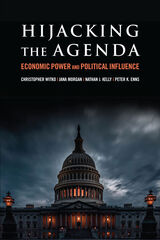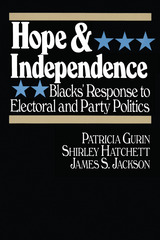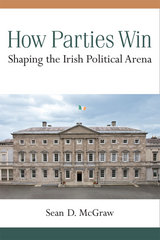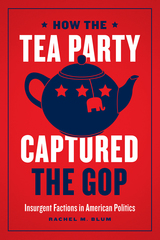149 books about Political Parties and 4
start with H
149 books about Political Parties and 4
149 books about Political Parties
4 start with H start with H
4 start with H start with H

Hijacking the Agenda
Economic Power and Political Influence
Christopher Witko
Russell Sage Foundation, 2021
Why are the economic interests and priorities of lower- and middle-class Americans so often ignored by the U.S. Congress, while the economic interests of the wealthiest are prioritized, often resulting in policies favorable to their interests? In Hijacking the Agenda, political scientists Christopher Witko, Jana Morgan, Nathan J. Kelly, and Peter K. Enns examine why Congress privileges the concerns of businesses and the wealthy over those of average Americans. They go beyond demonstrating that such economic bias exists to illuminate precisely how and why economic policy is so often skewed in favor of the rich.
The authors analyze over 20 years of floor speeches by several hundred members of Congress to examine the influence of campaign contributions on how the national economic agenda is set in Congress. They find that legislators who received more money from business and professional associations were more likely to discuss the deficit and other upper-class priorities, while those who received more money from unions were more likely to discuss issues important to lower- and middle-class constituents, such as economic inequality and wages. This attention imbalance matters because issues discussed in Congress receive more direct legislative action, such as bill introductions and committee hearings. While unions use campaign contributions to push back against wealthy interests, spending by the wealthy dwarfs that of unions.
The authors use case studies analyzing financial regulation and the minimum wage to demonstrate how the financial influence of the wealthy enables them to advance their economic agenda. In each case, the authors examine the balance of structural power, or the power that comes from a person or company’s position in the economy, and kinetic power, the power that comes from the ability to mobilize organizational and financial resources in the policy process. The authors show how big business uses its structural power and resources to effect policy change in Congress, as when the financial industry sought deregulation in the late 1990s, resulting in the passage of a bill eviscerating New Deal financial regulations. Likewise, when business interests want to preserve the policy status quo, it uses its power to keep issues off of the agenda, as when inflation eats into the minimum wage and its declining purchasing power leaves low-wage workers in poverty. Although groups representing lower- and middle-class interests, particularly unions, can use their resources to shape policy responses if conditions are right, they lack structural power and suffer significant resource disadvantages. As a result, wealthy interests have the upper hand in shaping the policy process, simply due to their pivotal position in the economy and the resulting perception that policies beneficial to business are beneficial for everyone.
Hijacking the Agenda is an illuminating account of the way economic power operates through the congressional agenda and policy process to privilege the interests of the wealthy and marks a major step forward in our understanding of the politics of inequality.
The authors analyze over 20 years of floor speeches by several hundred members of Congress to examine the influence of campaign contributions on how the national economic agenda is set in Congress. They find that legislators who received more money from business and professional associations were more likely to discuss the deficit and other upper-class priorities, while those who received more money from unions were more likely to discuss issues important to lower- and middle-class constituents, such as economic inequality and wages. This attention imbalance matters because issues discussed in Congress receive more direct legislative action, such as bill introductions and committee hearings. While unions use campaign contributions to push back against wealthy interests, spending by the wealthy dwarfs that of unions.
The authors use case studies analyzing financial regulation and the minimum wage to demonstrate how the financial influence of the wealthy enables them to advance their economic agenda. In each case, the authors examine the balance of structural power, or the power that comes from a person or company’s position in the economy, and kinetic power, the power that comes from the ability to mobilize organizational and financial resources in the policy process. The authors show how big business uses its structural power and resources to effect policy change in Congress, as when the financial industry sought deregulation in the late 1990s, resulting in the passage of a bill eviscerating New Deal financial regulations. Likewise, when business interests want to preserve the policy status quo, it uses its power to keep issues off of the agenda, as when inflation eats into the minimum wage and its declining purchasing power leaves low-wage workers in poverty. Although groups representing lower- and middle-class interests, particularly unions, can use their resources to shape policy responses if conditions are right, they lack structural power and suffer significant resource disadvantages. As a result, wealthy interests have the upper hand in shaping the policy process, simply due to their pivotal position in the economy and the resulting perception that policies beneficial to business are beneficial for everyone.
Hijacking the Agenda is an illuminating account of the way economic power operates through the congressional agenda and policy process to privilege the interests of the wealthy and marks a major step forward in our understanding of the politics of inequality.
[more]

Hope and Independence
Blacks' Response to Electoral and Party Politics
Patricia Gurin
Russell Sage Foundation, 1989
Over the past fifteen years, a New Black Politics has swept black candidates into office and registered black voters in numbers unimaginable since the days of Reconstruction. Based on interviews with a representative sample of nearly 1,000 voting-age black Americans, Hope and Independence explores blacks' attitudes toward electoral and party politics and toward Jesse Jackson's first presidential bid. Viewed in the light of black political history, the survey reveals enduring themes of hope (for eventual inclusion in traditional politics, despite repeated disappointments) and independence (a strategy of operating outside conventional political institutions in order to achieve incorporation). The authors describe a black electorate that is less alienated than many have suggested. Blacks are more politically engaged than whites with comparable levels of education. And despite growing economic inequality in the black community, the authors find no serious class-based political cleavage. Underlying the widespread support for Jackson among blacks, a distinction emerges between "common fate" solidarity, which is pro-black, committed to internal criticism of the Democratic party, and conscious of commonality with other disadvantaged groups, and "exclusivist" solidarity, which is pro-black but also hostile to whites and less empathetic to other minorities. This second, more divisive type of solidarity expresses itself in the desire for a separate black party or a vote black strategy—but its proponents constitute a small minority of the black electorate and show surprisingly hopeful attitudes toward the Democratic party. Hope and Independence will be welcomed by readers concerned with opinion research, the sociology of race, and the psychology of group consciousness. By probing the attitudes of individual blacks in the context of a watershed campaign, this book also makes a vital contribution to our grasp of current electoral politics.
[more]

How Parties Win
Shaping the Irish Political Arena
Sean D. McGraw
University of Michigan Press, 2015
In recent decades, Ireland’s three major political parties have maintained over 80 percent of the vote in the face of rapidly shifting social divisions, political values, and controversial issues, though not by giving voice to particular interest groups or reacting to issues of the day. Rather, Sean D. McGraw reveals how party leaders select, or purposely sideline, pressing political and social issues in order to preserve their competitive advantage. By relegating divisive issues to extraparliamentary institutions, such as referenda or national wage bargaining systems, major parties mitigate the effects of changing environments and undermine the appeal of minor parties.
This richly textured case study of the major parties in the Republic of Ireland engages the broader comparative argument that political parties actively shape which choices are available to the electorate and—just as importantly—which are not. Additionally, McGraw sets a new standard for mixed-method research by employing public opinion surveys, party manifestos, content analysis of media coverage, the author’s own survey of nearly two-thirds of Irish parliamentarians in both 2010 and 2012, and personal interviews conducted over the course of six years.
[more]

How the Tea Party Captured the GOP
Insurgent Factions in American Politics
Rachel M. Blum
University of Chicago Press, 2020
The rise of the Tea Party redefined both the Republican Party and how we think about intraparty conflict. What initially appeared to be an anti-Obama protest movement of fiscal conservatives matured into a faction that sought to increase its influence in the Republican Party by any means necessary. Tea Partiers captured the party’s organizational machinery and used it to replace established politicians with Tea Party–style Republicans, eventually laying the groundwork for the nomination and election of a candidate like Donald Trump.
In How the Tea Party Captured the GOP, Rachel Marie Blum approaches the Tea Party from the angle of party politics, explaining the Tea Party’s insurgent strategies as those of a party faction. Blum offers a novel theory of factions as miniature parties within parties, discussing how fringe groups can use factions to increase their political influence in the US two-party system. In this richly researched book, the author uncovers how the electoral losses of 2008 sparked disgruntled Republicans to form the Tea Party faction, and the strategies the Tea Party used to wage a systematic takeover of the Republican Party. This book not only illuminates how the Tea Party achieved its influence, but also provides a framework for identifying other factional insurgencies.
In How the Tea Party Captured the GOP, Rachel Marie Blum approaches the Tea Party from the angle of party politics, explaining the Tea Party’s insurgent strategies as those of a party faction. Blum offers a novel theory of factions as miniature parties within parties, discussing how fringe groups can use factions to increase their political influence in the US two-party system. In this richly researched book, the author uncovers how the electoral losses of 2008 sparked disgruntled Republicans to form the Tea Party faction, and the strategies the Tea Party used to wage a systematic takeover of the Republican Party. This book not only illuminates how the Tea Party achieved its influence, but also provides a framework for identifying other factional insurgencies.
[more]
READERS
Browse our collection.
PUBLISHERS
See BiblioVault's publisher services.
STUDENT SERVICES
Files for college accessibility offices.
UChicago Accessibility Resources
home | accessibility | search | about | contact us
BiblioVault ® 2001 - 2024
The University of Chicago Press









